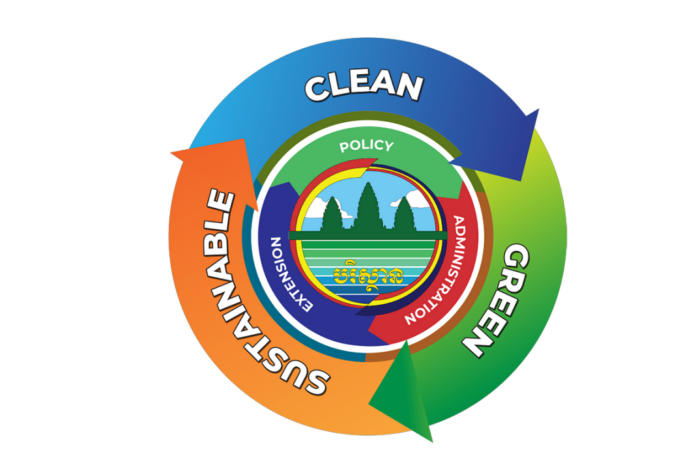The Royal Government of Cambodia, led by the Ministry of Environment, launched the Circular Strategy on Environment 2023-2028 on November 15, 2023. This historic launch event was spearheaded by H.E. Dr. Sophalleth Eang, Minister of the Environment, who unveiled the government’s comprehensive strategy to the world.
The strategy aims to harness the environmental sector’s potential to benefit the country and its citizens by promoting the sustainable use of renewable energy to address global climate change. It serves as a detailed roadmap, outlining priorities and actions for environmental sustainability, climate change resilience, and the advancement of a green economy. The ultimate goal is to transform Cambodia into a carbon-neutral nation with 60% forest cover by 2050.
Here is a brief summary and key highlights of the Circular Strategy on Environment 2023-2028 which was unveiled on November 15,2023.
The Royal Government of Cambodia, led by Samdech Akka Moha Sena Padei Techo Hun Sen, has successfully implemented the Triangle and Rectangular Strategies over four phases, resulting in significant advancements in political, social and economic spheres. These strategies have played a crucial role in shaping Cambodia’s development agenda, strengthening state institutions and modernizing governance for improved efficiency and socio-economic progress. Noteworthy achievements include Cambodia’s progress towards achieving low-middle-income status, substantial economic growth, poverty alleviation, and increased regional and global integration. Over the last thirty years, the Ministry of Environment has seen significant support and collaboration, leading to notable accomplishments in environmental management.
Building on these successes and great accomplishments of the last 25 years, Prime Minister Samdech Moha Borvor Thipadei Hun Manet introduced the Phase 1 of the “Pentagonal Strategy” during the 7th Legislature of the National Assembly. The Pentagonal Strategy aims to drive economic growth, job creation, equity, efficiency and sustainability towards realizing Cambodia’s Vision for 2050. The Ministry of Environment led by H.E. Dr. Eang Sophalleth, in alignment with Phase 1 of the Pentagonal Strategy, existing national policies and international frameworks, has formulated the “Circular Strategy on Environment 2023-2028” to ensure environmental sustainability, climate resilience and a green economy with the ultimate goal of becoming carbon-neutral by 2050. This comprehensive strategy, organized around a central core and three outer strategies, emphasizes policy improvement, digital administration, pollution control, sustainable resource management and collaboration for effective implementation. The Minister of the Environment highly acknowledged Prime Minister Samdech Moha Borvor Thipadei Hun Manet’s guidance in formulating and launching this strategy, aiming to benefit all current and future generations of Cambodians and enhance Cambodia’s global standing through collaborative efforts across sectors.
Introduction
The introduction discusses the significance of the environment within sustainable development and highlights Cambodia’s economic growth and stability alongside its Ministry of Environment’s key roles. It highlights that the Circular Strategy on Environment 2023-2028 is aligned with the national strategies, emphasizing the need for environmental management in areas like land, water, minerals and forestry, particularly amidst climate change challenges. It also notes governmental reforms and legal instruments aimed at ensuring environmental quality and sustainability. The Circular Strategy focuses on “clean,” “green,” and “sustainable” aspects towards achieving a carbon-neutral economy by 2050, intending to benefit all generations of Cambodians and contribute to global climate efforts.
Core Strategy
The core strategy outlined focuses on three key angles: enhancing policy, establishing digital administration, and broadening extension efforts. Under the first angle of enhancing policy, priorities include developing a circular strategy on the environment, strengthening relevant bodies, mobilizing green financing, conducting research, implementing strategies to reduce plastic usage, updating laws and regulations, establishing coordination mechanisms and organizing review meetings. These efforts aim to improve policy implementation, regulatory frameworks and collaboration for sustainable development goals.
The second angle revolves around establishing a robust digital administration, prioritizing digital infrastructure development, capacity building for officials and office space management. This includes installing efficient IT systems, providing necessary facilities, training officials and managing office spaces for optimal functionality.
The third angle focuses on broadening extension efforts, including spreading environmental awareness through public media campaigns, improving data management for environmental information, promoting eco-friendly practices and strengthening the capacity of environmental officials. These priorities aim to raise awareness, enhance data management and encourage sustainable behaviors across society.
Clean Strategy
The clean strategy outlined encompasses three main angles: controlling pollution, modernizing pollution measurement systems and improving environmental impact assessment.
Under the first angle of controlling pollution, priorities include enhancing waste management by updating legal instruments and guidelines, conducting clean-up campaigns and promoting the 4R Principle. Additionally, the strategy focuses on modernizing environmental quality management through legal documents for pollution control, enhancing monitoring mechanisms and establishing data management centers. Lastly, the strategy aims to promote waste management policies through education and data collection on hazardous substances.
The second angle revolves around modernizing pollution measurement systems. This includes equipping with modern technology and facilities for analyzing environmental quality aspects, establishing pollution analytical systems for quality assurance and strengthening service quality and staff capacity to meet customer needs.
The third angle emphasizes improving environmental impact assessment. This involves developing policies and legal documents related to metal exploration projects, evaluating investment projects and monitoring their implementation to ensure compliance with environmental principles.
Overall, these strategies present a comprehensive approach to address pollution control, modernize measurement systems and improve environmental impact assessment processes.
Green Strategy
The green strategy outlines a comprehensive strategy focused on three main angles: intensifying tree planting efforts, improving management of protected areas and enhancing local communities’ livelihoods.
Under the first angle, the strategy emphasizes the distribution of one million saplings annually through established tree nurseries, implementing an Annual Tree Planting Day and utilizing a digital data management system. Priority is given to expanding tree planting in degraded forest areas within Protected Areas and promoting tree planting in Community Protected Areas to attract investment and increase green cover.
The second angle highlights the need to bolster the management of Protected Areas through legal support, boundary demarcation and management plans. Efforts also target biodiversity conservation, habitat protection and monitoring mechanisms to track changes in forest cover effectively.
The third angle focuses on enhancing local communities’ livelihoods by promoting climate change adaptation strategies, clean energy practices and sustainable agriculture. It also aims to boost income through eco-tourism, cultural services and suitable employment opportunities while conserving natural and cultural resources and preserving local traditions, particularly among indigenous communities in protected areas.
Sustainable Strategy
Sustainable strategy outlines key priorities and strategies across three angles: applying compliance, expanding cooperation, and strengthening coordination.
Under the first angle, Applying Compliance, the focus is on aligning with the political agenda of the Royal Government of Cambodia for the 7th legislature of the National Assembly (2023-2028), emphasizing peace, independence, sovereignty and societal stability. Additionally, it aims to adhere to the Pentagon Strategy Phase 1 by developing key sectors, enhancing connectivity and strengthening economic zones, while ensuring compliance with national laws and international agreements related to environmental sustainability and data security.
Under the second angle, Expanding Cooperation emphasizes strengthening cooperation within ministries, local authorities and development partners to promote environmentally friendly activities. Priorities include leading and coordinating the implementation of environmental policies, negotiating international agreements and inspiring public engagement in environmental protection efforts.
Under the third angle, Strengthening Coordination highlights priorities such as enhancing the performance of working groups, facilitating program and project preparation and improving monitoring and evaluation in the field of environment and sustainable development. This involves updating coordination mechanisms, establishing management committees and strengthening program and project management units to ensure effective implementation and evaluation.
Implementation Mechanism
The Environmental Chakra Strategy (2023-2028) outlines the Ministry of Environment’s key objectives in promoting environmental protection, natural resource management and sustainable development. It emphasizes three core strategies – “Clean,” “Green,” and “Sustainable” – aimed at translating the potential of the environmental sector into tangible benefits for the Cambodian people across generations and contributing to global climate change mitigation.
Given the pivotal role of the environment alongside the pillars of economy, society and culture in fostering national sustainable development, the strategy underscores the need to enhance and broaden the capacity of various mechanisms. These mechanisms include inter-ministerial collaboration, ministry operations, technical working groups and sub-national initiatives, all geared towards fostering effective and efficient cooperation and coordination among stakeholders.
The inter-ministerial mechanism, embodied by the National Council for Sustainable Development (NCSD), operates under the mission of formulating and evaluating policies, strategies and resource mobilization efforts for sustainable development, encompassing natural resources management. This includes tasks such as policy formulation, resource mobilization, research promotion and fostering partnerships with stakeholders. Additionally, technical working groups within this mechanism play a vital role in coordinating activities, organizing events and monitoring progress in the environmental and sustainable development sphere.
At the ministry level, as outlined in Sub-Decree No. 234 dated 17th November 2021, the Ministry of Environment assumes leadership in environmental protection, biodiversity conservation and sustainable resource utilization. It collaborates with relevant ministries, institutions, and partners to develop policies, implement legal frameworks, and manage environmental activities effectively.
Further, sub-national mechanisms, including provincial, district-khan and commune-sangkat administrations, play crucial roles in implementing policies, coordinating with relevant departments and engaging local communities in environmental initiatives. These roles encompass policy implementation, natural resource management, community development support and stakeholder engagement, contributing to broader environmental sustainability goals.
Conclusion
The Win-Win policy implemented by Samdech Akka Moha Sena Padei Techo Hun Sen has significantly contributed to Cambodia’s peace, national unity and territorial integrity over the past 25 years. This approach has facilitated the successful implementation of the Triangle Strategy and the Rectangular Strategy in four stages, leading to notable achievements across political, social, and economic domains. As a result, Cambodia has gained recognition and respect on the global stage. Building upon these achievements, the environmental sector remains a priority in the political agenda of the Royal Government of Cambodia, particularly in the 7th legislature of the National Assembly and the first phase of the Pentagonal Strategy. Under the leadership of Samdech Moha Borvor Thipadei Hun Manet, Prime Minister of the Kingdom of Cambodia, the Ministry of Environment has developed the Circular Strategy on Environment for 2023-2028, serving as a roadmap for the next five years. This strategy, centered around building digital administration, expanding dissemination, and strengthening policies, encompasses three core strategies: Clean, Green, and Sustainable. Through the Circular Strategy on Environment 2023-2028, Cambodia aims to enhance environmental sustainability, respond to climate change and promote a more efficient green economy, thereby bolstering the nation’s prestige on the international stage while benefiting future generations of Cambodians.



